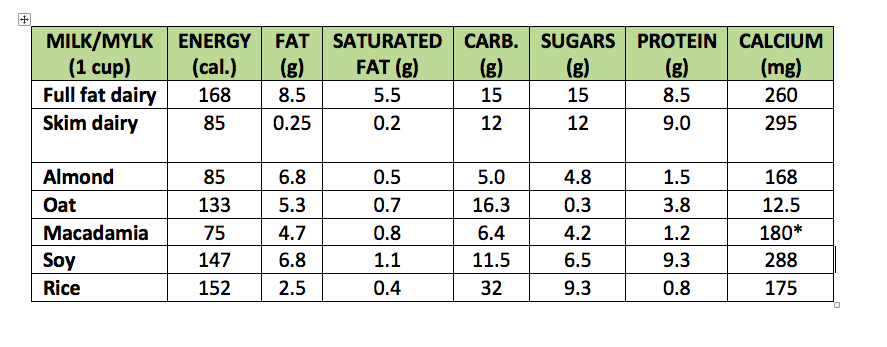Ordering a coffee these days is no straight forward request. Where once the big question was whether to have a full fat or skinny latte now the choices seem endless. In the last year plant-based milks, or rather mylks, have become de rigueur – soy, oat, almond, macadamia, coconut, rice, cashew even hazelnut and walnut are making a showing. While these alternatives are a great option for those allergic to dairy or who follow a vegan diet, nutritionally they are quite different to dairy milk. So what exactly does your mylk of choice contain and how does it rate on a nutritional scale?
Well known as a rich source of calcium, dairy milk also provides protein, riboflavin, potassium and vitamins A, D and B12. Unfortunately some people find dairy milk difficult to digest – most commonly due to the lactose (milk sugar) it contains. Lactose free milk is readily available in supermarkets. While not containing any more sugar than regular milk it does taste sweeter due to the conversion of lactose to the simple sugars glucose and galactose. If you find this too sweet plant-based options are an alternative. If this is your choice and you were previously counting on your dairy milk coffee for your calcium intake ensure your diet contains other sources of calcium such as leafy greens, broccoli, almonds, white beans and tahini.
Many commercial nut mylks don’t actually contain a lot of nuts with the average being 3-5 % of total volume. This changes if you are making your own nut mylks at home. The advantage of commercial blends is that they are often fortified with key nutrients that we associate with dairy milk such as calcium and vitamin D. Below is a table comparing the main nutritional values of popular milk and mylk options.
Nutritional Profile (average) of Milk/Mylks
*estimated
Check the labels. Be sure to check the labels of your mylk of choice. Apart from the obvious addition of water most commercial mylks have other ingredients added to them to them such as stabilizers, thickeners and are fortified with calcium, vitamin D and protein. Watch out for those with added sugars and vegetable oils.
The bottom line. Ultimately dairy is naturally more nutritionally dense with good levels of calcium, protein, vitamins D and B12 and no additives. For those with intolerances, allergies or who wish to forgo animal products plant based mylks are a viable option. Opt for those with the least additives and that have been fortified with calcium. If fortification is not an option ensure you look for other sources of calcium and protein in your diet. This is of particular importance for young children, growing teens and pregnant women.
Need to check how much calcium your getting? Then book in to have a dietary analysis done. Follow this link for details Dietary Analysis with Northern Beaches Nutrition





